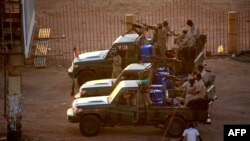Clashes between Sudanese security forces in the capital this week have raised questions about loyalty and stability in the military and the country’s transitional unity government, with some Sudanese seeing the violence as a serious threat to the nation's security and its move toward democracy.
The ongoing violence in Khartoum, coming on the heels of the country's recent political change, suggests trouble is brewing for Sudan's new government, political analyst Tarig Othman said via Whatsapp.
The biggest challenge is the existence of different troops who carry different loyalties and possess heavy weapons, linked with the different interests of the regional axes in Sudan, said independent military analyst Omer Ahmed.
The gunfire began Tuesday when security troops who were loyal to former President Omar al-Bashir refused to hand over assets and weapons to the new authorities.
Sudan's transitional government had earlier issued a decision either to unify the troops in the military or dismiss the soldiers. However, dismissed security troops demanded a $30 million after-service bonus and blocked roads in some neighborhoods.
An estimated 13,000 soldiers worked for Sudan's security and intelligence forces, and participated in military operations since the 1990s.
Many of the protesters who helped topple Bashir last April demanded the security forces be dissolved and their weapons to be collected.
Protester Israa Ahmed said she was not surprised by Tuesday's clashes, adding that citizens called many times for dissolving the national security forces troops and not allowing any service members except the military to carry weapons.
On Wednesday, Sudan’s military maintained control of government buildings and guarded sensitive locations. However, many Sudanese remain worried that the security situation could unravel quickly.




